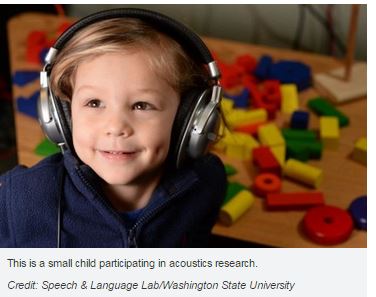Secrets of Baby Talk: Why Mothers Say Coo While Fathers Stay Cool
[Source: Science Daily]

Babytalk, which includes higher-pitched voices and a wider range of pitches, is sometimes known as “motherese,” partly because most research on parent-child interactions has traditionally focused on the mother’s role. Scientists study this common behavior because they want to understand what role such speech patterns play in children’s language acquisition. But in an era of increased paternal involvement, researchers are investigating whether fathers modify their speech in the same way mothers do.
Even to the casual observer, there’s no mistaking how some perfectly mature parents will affect an infantile elocution when talking to their young children, speaking in higher-pitched voices with a wider range of pitches and frequently switching between highs and lows. This sort of babytalk is sometimes known as “motherese,” in part because most research on parent-child interactions has traditionally focused on the mother’s role. Scientists study the common behavioral phenomenon because they want to understand what role such speech patterns play in the child’s language acquisition.
Read the Rest of this Article on Science Daily
PediaStaff is Hiring!
All JobsPediaStaff hires pediatric and school-based professionals nationwide for contract assignments of 2 to 12 months. We also help clinics, hospitals, schools, and home health agencies to find and hire these professionals directly. We work with Speech-Language Pathologists, Occupational and Physical Therapists, School Psychologists, and others in pediatric therapy and education.
